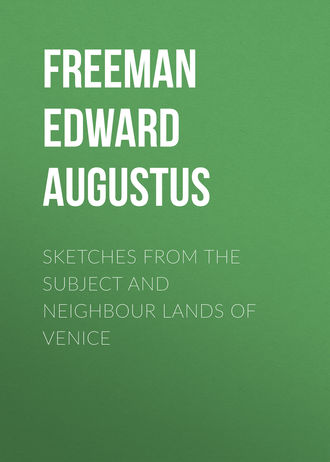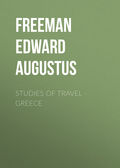
Freeman Edward Augustus
Sketches from the Subject and Neighbour Lands of Venice
And it may be that it is no common anniversary on which we look out on the land which has passed into bondage. Looked at by the evening light of the twenty-ninth day of May, the group of buildings at Durazzo, alike by what is present to the eye and by what is absent, brings to the mind the fate of a greater city than Durazzo was in its proudest day. It makes us muse how, after four hundred and eight and twenty years, we have still to repeat the Psalmist's words: "O God, the heathen have come into thine inheritance; thy holy temple have they defiled, and made Jerusalem an heap of stones." Durazzo has not indeed, like some other cities under the yoke, sunk to a heap of stones; but it is easy to see how the Turkish town has shrunk up within the Venetian walls, and again how narrow must be the circuit of Venetian Durazzo compared with the Epidamnos of the days of Thucydides, or even with the Dyrrhachion beneath whose walls our banished kinsmen so well maintained the cause of the Eastern Augustus. For the church that they so stoutly defended we need not say that it is vain to look in such a Pisgah view of the city as is all that we can take. But to the left of the present wall, where the hill soars, one stage upon another, far above the height of Durazzo that now is, we must surely place the site of the akropolis of the old Korkyraian settlers. Such a post, looking over the wide bay and commanding its mouth, would be just what would commend itself to the Greek colonists for the site of their new stronghold, while the lower city would naturally be spread over the more sheltered ground which holds all that is left of Durazzo under the rule of the Turk. Pausanias indeed implies that there had been a change of site before his time, that the Dyrrhachion of his day did not stand on exactly the same ground as the elder Epidamnos. No doubt the loftier site was the older; men came down from the hill-top as they did at Athens and Corinth. Thus much the passing stranger can see of this historic spot, even without setting his foot on the soil which the barbarian has torn away from Christendom. His course will bear him on to the place of his next halt, to the spot which, only a few months back, was the last soil which Christendom had won back from the barbarian. Since then, if another land has been denied the promised freedom, in a third the boon has been actually bestowed. And we may comfort ourselves by thinking that, while the shame of what is left undone belongs to others, the praise of what is done belongs to our own land only. We may comfort ourselves too by further thinking that right and freedom are powers which have an awkward way, when they have taken the inch, of going on to take the ell. The wise men whose wisdom consists in living politically from hand to mouth, are again crying out against "re-opening the Eastern question." In sailing along the shores, in scanning their history in past and present times, we feel how deep a truth was casually uttered in the shallow sneer which called that question "eternal." We feel how vain is the dream of those who think that this or that half-measure has solved it. As we gaze on enslaved Durazzo, with free Greece behind us, with free Montenegro before us – as we run swiftly in our thoughts over the long history of the spot – as we specially call up the deeds of our own countrymen on the shore on which we look – we feel that something indeed has been done, but that there is yet much more to do. Before us, behind us, are lands to which England, and England only, has given freedom. A day must come when, what England has done for Corfu, for Arta, and for Dulcigno, she must do for Jôannina and for Durazzo.
ANTIVARI
1881
We wind up our course with one more of the once subject cities of Venice, one where we can hardly say that we are any longer following in Norman footsteps, but whose history stands apart from the history of Dalmatia and Istria, while it has much in common with our last halting place. But here the main interest belongs to our own day. It is with new and strange feelings that we look out on a land which, when we last passed by it, was still clutched tight in the grasp of the barbarian, but to which we can now give the new and thrilling name of the sea-coast of Tzernagora. And yet it is with mingled feelings that we gaze. We rejoice in the victories, in the extension, of the unconquered principality, the land which has shown itself a surer "bulwark 'gainst the Ottomite" than Hungary or Poland, or even Venice, ever proved. We rejoice that the warriors of the mountain, long shut in by force and fraud, have again, with their own right hands, cut their way to their own sea. And yet we feel that, though the sea to which they have cut their way is truly their own sea, their own ancient heritage, yet the coast and the havens which they have won are not the coast and the havens which they should have won. If all had their own, Dulcigno, Antivari, and the ewe lamb which the rich man stole at Spizza, would be the havens of the free Albanian, while the free Slave would have his outlet to the Hadriatic waters at his own Cattaro and at Ragusa too. In such an ideal state of things, the present lord of Cattaro and Ragusa might reign peaceably and harmlessly in the duchy of his grandmothers, happy in deliverance from the curses of those whom he now keeps back from union with the brethren whom they love and with the one prince whom they acknowledge. The Montenegrin, in short, kept back by wrong from winning his way to the sea by peaceful union with those who yearn for his presence, has been driven to win his way to the sea by the conquest of lands which were once the heritage of his race, but from which his race has now passed away. Forbidden to be the deliverer of the Slave, he has been forced to be the conqueror of the Albanian. The Albanian Mussulman himself has practically gained by being conquered; still, as we said, if every one had his own, arrangements would be different. The blame indeed lies, not with the people who extend their borders when to extend their border is a matter of national life, but with those who, not in the interest of any people, nation, or language, but in the private interest of their own family estate, sit by to hinder them from extending their borders in the right way. We rejoice then as we look for the first time on the sea-coast of Montenegro; but we mourn that the sea-coast of Montenegro lies where it does and not elsewhere. We mourn too that the enlargement of Christendom, the falling back of Islam, has been bought only by the destruction of an ancient and beautiful city from which the memorials at least of Christendom had not wholly passed away.
Antibaris, Antivari, in the tongues of the land, Bar and Tivari, is perhaps rather to be understood as meaning "the Bari on the other side" than "the city opposite Bari." But there is no doubt that its name contains, in one way or another, a reference to the more famous Bari, "Barium piscosum," on the other side of the Hadriatic. And Antivari is the opposite to Bari in a sense which was certainly not meant; no two sites can well be more unlike one another than the sites of Bari and of Antivari. The Apulian Bari lies low on a flat shore, with not so much as a background of hills; the Albanian Bari crowns a height, with a wall of more soaring heights on each side of it. The Apulian Bari had no chance of occupying such a position as this; the marked difference between the two coasts of the Hadriatic forbade it. But the site of Antivari is hardly less unlike most of the other sites on its own coast. Zara, Salona and its successor Spalato, Epidauros and its successor Ragusa, Cattaro, Durazzo, and a crowd of others of lesser name, are none of them placed on heights. Some of them nestle immediately at the foot of the mountain; some have thrown out their defences, older or newer, some way up the side of the mountain; in none is the city itself perched high on the hills. For a parallel to Antivari on this coast we have to go back to the mountain citadel of Aulona. The position and the name of Antivari seem to point to a state of things differing both from the days of the Greek and Roman foundations, and from the days of the cities which arose to shelter their fugitives in the day of overthrow. Long Salona stood low on the shore; the house of Jovius stood low on the shore also; it did not come into the head of the founders of either to plant city or palace on the height of Clissa. When Antivari arose, it would seem that men had gone back to that earlier state of things which planted the oldest Argos, even the oldest Corinth, on mountain peaks some way from their own coasts. The inaccessible height had again come to be looked on as a source of strength. Antivari may take its place alongside of the mediæval Syra, the Latin town covering its own peaked hill – a mons acutus, a Montacute, by the shore – while the oldest and the newest Hermoupolis lies on the shore at its feet. The town does not even look down at once on the haven; it has to be reached in a manner sideways from the haven. It is true indeed that the sea has gone back, that the plain at the foot of the mountains between the town and the shore was smaller than it now is, even in times not far removed from our own. But Antivari was never as Cattaro; it always stood on a height, with some greater or less extent of level ground between the town and its own haven.
The city thus placed has gone through its full share of the revolutions of the eastern coasts of the Hadriatic. Once a commonwealth under the protection of the Servian kings and tzars, it came late under Venetian rule. But it remained under that rule down to a later time than any other of the possessions of the Republic on this coast, save those which came within the actual Dalmatian border and those detached points further to the south which have a history of their own in common with the so-called Ionian Islands. It was for a while in the fifteenth and sixteenth centuries, what Budua was for so long afterwards, the furthest point of the continuous rule of Saint Mark, a city which remained part of Christendom after Durazzo and Skodra had passed into the hands of the infidel. In earlier times, when Antivari had a separate being, its tendency was rather to a connexion with Ragusa than with Venice. Ragusa, though the nearer of the rivals, was the weaker, the less likely to change alliance or protection into dominion. Antivari too, like most other city-commonwealths, had its patricians and plebeians, its disputes between the privileged and the non-privileged order. As the justice of either side at home was distrusted, it was agreed that the decision of some classes of causes should be referred to the courts of Ragusa. Such a settlement, though taking another and more dangerous form, is the same in principle as the favourite Italian custom of choosing a foreign podestà, as the earlier usage by which cities which had won their independence in all other points were still willing to receive a criminal judge of the Emperor's naming. In all these cases alike, the stranger is looked on as more likely than the native to deal out even-handed justice amid the disputes and rivalries of persons and parties.
Though Antivari stands on a hill, it does not crown any such height as those of Cortona or Akrokorinthos, nor does it call for any such journey as that which leads to the spot which masters of the high-polite style will now doubtless call its "metropolis" at Tzetinje. It stands on an advanced point among the mountains, one easily commanded from higher points, as was soon found in the siege of 1877. A road of no astonishing steepness leads us up to the town – or more strictly to its ruins. We look down on a church in the valley, whose air proclaims it as belonging to the Orthodox communion; and that church seems to be the only untouched building within sight. It is not till we get within the walls that we take in the full measure of the destruction which has been wrought; but the first glance shows that Antivari has suffered not a little from the warfare of our own times. The walls and towers are there; but we see that they fence in only roofless buildings; the mosques, with their minarets, several of them shattered, remind us that we are drawing near to a city which has been won for Christendom from Islam, as a nearer view reminds us that it is a city which had before been won for Islam from Christendom. We halt at a small café outside the walls, where we receive a friendly greeting from the representatives of Montenegrin authority in the new conquest. Here too is the club and reading-room of Antivari, supplied with newspapers in the Slavonic, Italian, and Turkish tongues; the really prevailing speech of the district, the immemorial Skipetar or Albanian, hardly boasts of a representative in the press. Here too are gathered a few fragments from the ruins, a few capitals, sculptures, and inscriptions, all or most of Venetian times. Among them is the winged lion himself, and the epitaph of a local dignitary who bears the very English-sounding title of "justitia pacis." Even among ourselves embodied righteousness sometimes takes the same abstract form, instead of the more mortal and fleshly "justitiarius." A slight descent and a steep ascent leads us through a rebuilt suburb, which now forms the only part of Antivari which serves as a dwelling-place of man. A line of shops, or rather booths, supplies the needs of the neighbouring people, among whom Christians and Mussulmans, Slaves and Albanians, seem pretty equally mingled. A Montenegrin sentinel, whose national coat must once have been whiter than it now is, guards the gate, a Venetian gate where inscriptions in the Arabic character record the dominion of the late masters of Antivari. We enter, we gaze around, we climb a tower for a better view, and we look on a scene of havoc which is startling to men of peaceful lives, and which, one would think, must be unusual even in the experience of men of the sword. We believe that we are speaking the truth when we say that every building within the enclosed space has become uninhabitable; certainly not one seemed to be inhabited. This destruction is indeed not wholly the immediate result of the siege. A powder-magazine was afterwards struck by lightning, and its explosion destroyed whatever the siege had spared. But the havoc wrought by the siege itself must have been fearful. Antivari is as strictly a collection of ruins, and of nothing but ruins, as Ninfa at the foot of the Volscian hills, looking up at the mighty walls of Norba. But Ninfa was simply forsaken some ages back. Its inhabitants fled from an unhealthy site, and left their houses, churches, and military defences, to crumble away. But at Antivari we see the work of destruction in our own day, almost at the present moment. Four years back, the traveller passing along the Albanian coast was shown where Antivari, then an inhabited town, nestled among its rocks. The war was then raging inland; the Montenegrin was then defending his own heights against Turkish invasion; he had not yet come down to win back a fragment of his ancient coast from one of the two intruders who kept him from it. The traveller comes again; this time he does not only look from afar, but examines on the spot with his own eyes. But he finds only the shattered fragments of what four years before was a city of men.
And, small as Antivari must have been even in its most flourishing times, it is no mean city that it must have been. It must be remembered that Antivari, though it was a Mussulman town under Turkish rule, was never in any strict sense a Turkish town. Its history is that of Albania generally, as it is the history of large classes of men in Bosnia. Antivari was easily won by the Turk, and it remained in the hands of its old inhabitants, Christian Albanians and Venetian settlers. Gradually, for the sake of their temporal interests, they conformed outwardly to the religion of their conquerors, and so passed from the subject to the ruling order. At first, this was a mere outward conformity for worldly ends; men still hoped that some chance of warfare would bring back the rule of Saint Mark. If so, they were ready to return to the faith which they still secretly held. But the happy revolution never came; new generations sprang up with whom Islam was an hereditary creed, and Antivari became a Mussulman city. But it never became a Turkish city. The descendants of the once Christian inhabitants lived on in their fathers' houses, and worshipped in the same temples as their fathers, though they were now turned to the use of another faith. Each church had a minaret added, and it became a mosque. In most cases of Mahometan conquest, the conquerors took the head church of the city as a trophy of their own faith, but left the subject Christians in possession of one or more of the lesser churches. So, in this same region, it was at Durazzo; so it was at Trebinje; in both there was a church, or more than one, within the walls. Here at Antivari, as the inhabitants gradually embraced Islam, all the churches became mosques; and thus, for the very reason that there was less of violent disturbance than in most cases of Turkish conquest, Antivari, while never becoming Turkish, became more strictly Mussulman than most cities under Turkish rule. The churches, or rather their ruins, still stand, examples of the usual churches of the country, none of them remarkable for size or antiquity or architectural splendour; but still essentially churches, with their fabrics untouched, save only the inevitable addition of the minaret. Some of them even keep memorials of their earlier use of which one would have expected Mussulman zeal to wipe out every trace as monuments of idolatry. Intruding Turks or Saracens would doubtless have done so; but the Mahometan descendants of the Christian citizens of Antivari still felt a tenderness for the works of their forefathers. Even pictures of Christian subjects have been spared. In one case especially, in a church which does not seem ever to have been a mosque, but, as having perhaps been a private chapel, to have formed part of a private house, among other kindred pictures, the baptism of our Lord in Jordan is still almost as clear as when the painter first traced it on the wall. Old ancestral memories, perhaps the vague feeling that after all a day of change might come – the feeling which led Bosnian beys, while holding their Christian countrymen in bondage, to keep Christian patents of nobility and even concealed objects of Christian worship – were clearly stronger in Antivari than any strict regard to the Mussulman law.
And as it was with the churches, so it was with the houses. Antivari never became, like Trebinje, a tumble-down Eastern town, nor, like Butrinto, a collection of beggarly huts, not fit to be called a town at all. It was a small, but well-built city, after the pattern of the other cities on the eastern coast of the Hadriatic. There was clearly no moment of general havoc; the Mussulman lived on in the house of his Christian father. Some of those houses must have been still almost new when their owners embraced the faith of their conquerors. At every step we see among the shattered houses some pretty scrap, door or window, of the style which we commonly call Venetian; we see some too which belong to the confirmed Renaissance, and which can hardly be older than the sixteenth century. One stately building indeed seems to have perished. An old print of Antivari, in a book called Viaggio da Venetia a Costantinopoli, a book without date but which has an air of the sixteenth century, shows what is plainly meant for a municipal palace, after the same general type as the bigger one at Venice and the more beautiful one at Ragusa. It has arcades below and windows above. Still as we tread, even in their state of ruin, the streets, the little piazze, of what once was Antivari, we see that the city perched on its Albanian height must have been no unworthy fellow of its neighbours on the Dalmatian shore.
It is sad that the enlargement of Europe and of Christendom, the winning back of their ancient coast by the valiant warriors of the Black Mountain, should have been bought only at such a price as the destruction of this interesting and really beautiful little city. The loss, it may be feared, cannot be repaired. A gently working hand might possibly set up again the ruined houses and churches nearly as they once were. Or it might at first sight seem a more obvious work to forsake the ruined hill-town, and to build another by the haven, a new Montenegrin Cattaro, to make up as far as may be for the city by the Bocche so cruelly torn away from its free brethren. But either scheme seems to be forbidden by the growing unhealthiness of the spot. The place has been for some while getting more and more fever-stricken, and the disease has now – seemingly since the siege – spread upwards to the hill-town itself. It is for medical knowledge to judge whether, as is said to be the case in some parts of the Roman Campagna, sudden colonization, the settlement of a large number of new inhabitants at once, could do anything to check the evil. Failing this chance, it would seem as if Antivari was doomed utterly to perish. A new Montenegrin town and haven may arise, but not on the site of the ancient town and haven of the eastern Bari.
On whom rests the blame? Surely not on the conquerors, whose warfare was waged in the noblest cause for which man can fight, for their faith, their freedom, their national life, the extension of freedom and national life to their brethren under the yoke. Nor can we say that it rests with the men who fought against them, who, from their own side, were fighting for faith and freedom and national life fully as much. It rather rests with the dangerous neighbour of both, whose very existence is founded on the trampling down of freedom and national life among all its neighbours. It rests with the power which takes care to strike no blows itself, but which knows how to suck no small advantage from the blows which are struck by others on either side. The ruin of Antivari is in truth the work, though the indirect work, of the power hard by, the power which was not ashamed to stretch forth its hand for such a spoil as Spizza, the hard-won earnings of its poor neighbour. The guilt of ruined Antivari rests with those who drove its conquerors to conquest in the wrong place by hindering them from peaceful advance in the right place. It rests with those who stirred up its defenders to a hopeless resistance by promises which never were fulfilled. When we see how in 1878 Montenegro was allowed to keep possession of ruined and almost worthless Antivari, but was forced to give up its other comparatively flourishing conquests of Spizza and Dulcigno, we better understand how the rule of doing as one would be done by is looked on in the council-chamber of an Apostolic King. And we see too, with some comfort, how England, as one of her first national acts when England found herself once more under English leadership, knew how to step in, with vigour and with patience, to undo at least one part of the wrong which had been done.







